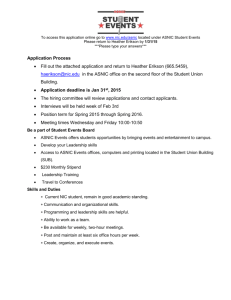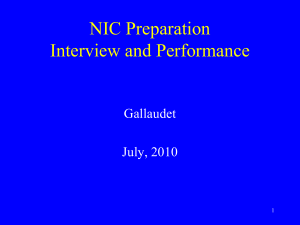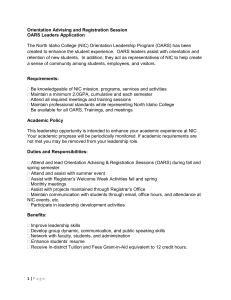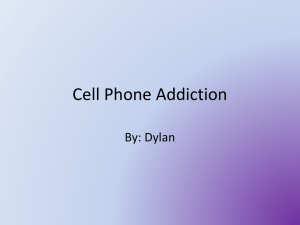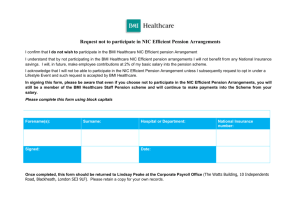Press Release
advertisement
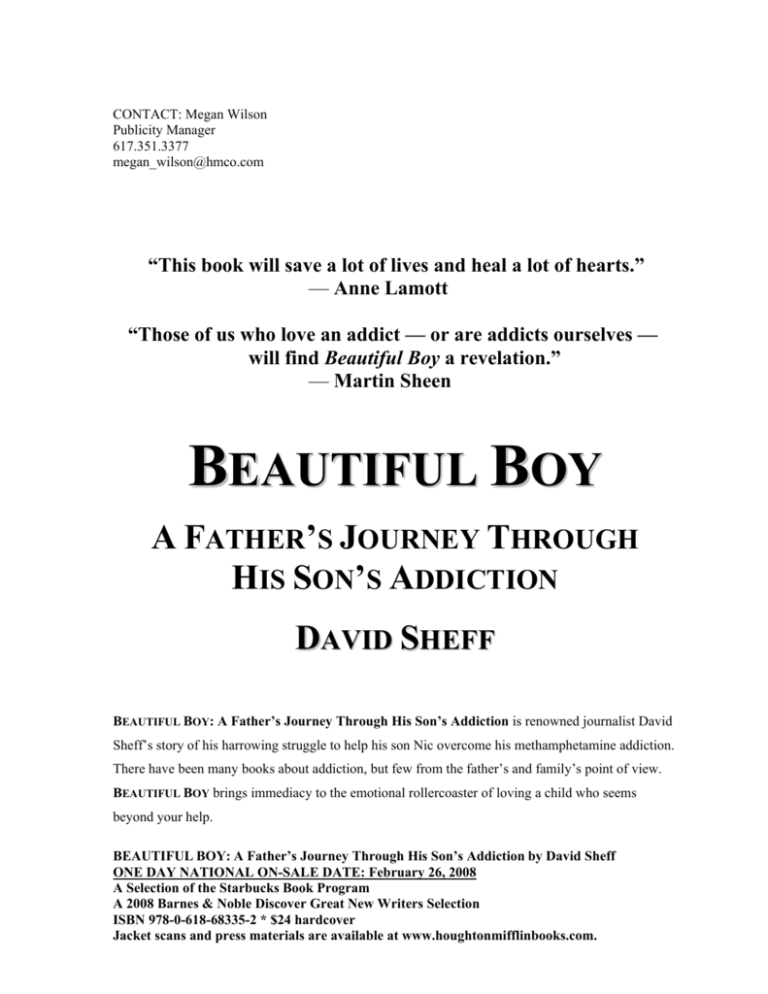
CONTACT: Megan Wilson Publicity Manager 617.351.3377 megan_wilson@hmco.com “This book will save a lot of lives and heal a lot of hearts.” — Anne Lamott “Those of us who love an addict — or are addicts ourselves — will find Beautiful Boy a revelation.” — Martin Sheen BEAUTIFUL BOY A FATHER’S JOURNEY THROUGH HIS SON’S ADDICTION DAVID SHEFF BEAUTIFUL BOY: A Father’s Journey Through His Son’s Addiction is renowned journalist David Sheff’s story of his harrowing struggle to help his son Nic overcome his methamphetamine addiction. There have been many books about addiction, but few from the father’s and family’s point of view. BEAUTIFUL BOY brings immediacy to the emotional rollercoaster of loving a child who seems beyond your help. BEAUTIFUL BOY: A Father’s Journey Through His Son’s Addiction by David Sheff ONE DAY NATIONAL ON-SALE DATE: February 26, 2008 A Selection of the Starbucks Book Program A 2008 Barnes & Noble Discover Great New Writers Selection ISBN 978-0-618-68335-2 * $24 hardcover Jacket scans and press materials are available at www.houghtonmifflinbooks.com. The book grew out of a powerful piece Sheff wrote for the New York Times Magazine, “My Addicted Son,” which drew an overwhelming response from readers, grateful that Sheff had finally given voice to the devastating experience they shared. Moved by Sheff’s story, Starbucks has chosen the title as the next selection in its book program. The book will be available starting Tuesday, February 26, at Starbucks stores and traditional booksellers across the United States. Before meth, Nic was an exceptionally bright and joyful child, a varsity athlete, an honor student, and an award-winning journalist. On meth, he became unrecognizable, a trembling wraith who stole money from his eight-year-old brother and lived on the streets. BEAUTIFUL BOY traces the first subtle warning signs, the denial (by child and parents both), the three a.m. phone calls (is it Nic? the police? the hospital?), the multiple attempts at rehab and the multiple relapses, and, at last, the way past addiction. Sheff exposes how insidiously addiction creeps into a family and takes over, how each family member’s well-being can so easily become dependent on the addict’s. He illustrates how guilt, selfblame, and incapacitating worry can consume a parent, and how compelling the drama and trauma of addiction can be. The bottom line, Sheff reveals, is that caring about an addict is as complex, fraught, and debilitating as addiction itself. And so it is not only the addict who must recover; the family must mend itself too. A book in which those who care about the addicted will find commiseration and inspiration, BEAUTIFUL BOY is a universal story that will resonate with every parent facing the enormous challenge of raising children today. While Sheff acknowledges that there is no single or easy answer, he hopes that in BEAUTIFUL BOY “there may be some solace, some guidance, and, if nothing else, some company.” Nic has written his own memoir, aimed at younger readers coming out at the same time: TWEAK: Growing Up on Methamphetamines (Atheneum Books for Young Readers/Ginee Seo Books). Father and son will be on a national tour together beginning February 26 and are available for interviews. ### ABOUT THE AUTHOR David Sheff’s books include Game Over, China Dawn, and All We Are Saying. His many articles and interviews have appeared in the New York Times, Rolling Stone, Playboy, Wired, Fortune, and elsewhere. His piece for the New York Times Magazine, “My Addicted Son,” won an award from the American Psychological Association for “Outstanding Contribution to Advancing the Understanding of Addiction.” Sheff and his family live in Inverness, California. Advance Praise for BEAUTIFUL BOY “This is a brilliant, harrowing, heartbreaking, fascinating book full of beautiful moments and hard-fought wisdom. This book will save a lot of lives and heal a lot of hearts. I absolutely could not put it down: I read it straight through in two nights.” — Anne Lamott, author of Operating Instructions and Traveling Mercies “Sheff’s story is honest, reflective and deeply moving. Sadly, it is a story all too relevant for our troubled times. When one of us tells the truth, he makes it easier for all of us to open our hearts to our own pain and to that of others. That’s ultimately what Beautiful Boy is about: truth and healing.” — Mary Pipher, author of Writing to Change the World and Reviving Ophelia “Those of us who love an addict — or are addicts ourselves — will find Beautiful Boy a revelation. David Sheff knows all too well what must be endured with faith, and his extraordinary book describes it better than anything else I’ve read. While painfully candid, Beautiful Boy is equally optimistic and powerful.” — Martin Sheen, actor “An extraordinary story of pain, perseverance and hope.” — William C. Moyers, author of Broken “Here are the mysteries of love and grief, fear and faith, power and surrender. Here is a perilous, redemptive read: a text for any father, any parent, anyone who has ever wrestled with holding on and letting go.” — Thomas Lynch, author of The Undertaking and Bodies in Motion and at Rest “This story of parental love is a masterpiece of description and feeling. Sheff portrays addiction and its confusion in a way which is immediate, informative and heartbreaking. His quest for healing is a riveting suspense story which will enlighten and compel anyone who has ever dealt with addiction, and anyone who has ever raised a child.” — Susan Cheever, author of Note Found in a Bottle and My Name Is Bill “My generation experimented with drugs, and now that we are parents, we’re caught off guard. We never contemplated having to face what David Sheff has faced. He writes with candor, courage, and grace his family’s harrowing — and sadly not atypical — story. Beautiful Boy is an important book. It is moving, timely, and sobering. It’s also startlingly beautiful.” — Sir Richard Branson, chairman, Virgin Group “Beautiful Boy is so beautifully written that it will come as a welcome balm to millions of parents and loved ones who thought they were making this journey alone.” — Armistead Maupin, author of Michael Tolliver Lives and The Night Listener “An excellent book that all parents can relate to, whatever their children’s situation” — Library Journal, starred review “An honest, hopeful book, coming at a propitious moment in the meth epidemic.” —Publishers Weekly David & Nic Sheff’s National Tour NEW YORK CITY Starbucks, 29th & Park, February 26, 12:00 noon BOSTON Porter Square Books/local school event, February 28, 12:50 p.m. Starbucks, Davis Square, February 28, 6:00 p.m. WASHINGTON, D.C. Starbucks, Gelman Library, George Washington University, March 3, 3:00 p.m. CHICAGO Borders Books & Music, Naperville, March 4, 7:00 p.m. Starbucks, Wilmette–Sheridan Road, March 5, 10:00 a.m. MINNEAPOLIS Starbucks, Plymouth Station, March 6, 4:00 p.m. DALLAS Starbucks, Southlake Town Center, March 10, 7:00 p.m. LOS ANGELES Barnes & Noble, Huntington Beach, March 11, 7:00 p.m. Vroman’s/Pasadena High School, March 11, 12:30 p.m. Starbucks, Broxton & Weyburn, March 12, 2:00 p.m. BAY AREA Starbucks, Mariposa & Bryant, San Francisco, March 13, 6:00 p.m. Books Inc./Capuchino High School, San Bruno, March 14, 10:45 a.m. Pleasanton Library, March 14, 7:00 p.m. San Francisco Jewish Community Center, April 1, 8:00 p.m. Book Passage/Marin Country Day School and Beyond Borders, Corte Madera, April 2 Rakestraw Books/Athenian School, Danville, April 3, 9:45 a.m. Copperfield’s Books, Petaluma, April 3, 7:00 p.m. SEATTLE Starbucks, University Village, March 17, 7:00 p.m. Third Place Books/local school event, March 18, daytime Third Place Books in-store event, March 18, 7:00 p.m. PORTLAND Barnes & Noble, Clackamas, March 19, 7:00 p.m. A Conversation with David Sheff It’s probably unprecedented to have a father’s and a son’s memoirs published at the same time. How did it come about? Both books grew out of an article I wrote about Nic in the New York Times Magazine. Called “My Addicted Son,” the piece generated an almost overwhelming number of letters, many from parents of addicted children. The response made clear to me that there was a need for a story of addiction from the perspective of a parent. Meanwhile, one letter was from an editor who wanted to know if Nic, also a writer, might be interested in telling his story, too. I forwarded it. Let’s talk about his book first. His account is harrowing — every parent’s nightmare. What was it like to read it? Not as hard as it was to live it. But reading it was ghastly, a reminder of the horrors. It would have been painful to read if it was anyone’s child, but it was unbearable to know it was mine. Though I lived it, it’s nonetheless almost impossible to reconcile the Nic I know with the self-destructive boy in the book. What didn’t you know about that was in Nic’s book? When he left home and was out on the streets, I imagined nightmarish things, but now I know that the reality was worse. I was appalled and horrified and overwhelmed by much of it. To have your child descend into prostitution and stealing is unfathomable for almost every parent. It was for me. I could barely get through a page or two before I would be in tears. Nic easily could have died many times, and that was the most painful part of his book: the volume and variety of drugs he used. I would think of Nic as a child — my beautiful boy — and die inside to read what he did to his body. You can’t name a drug he didn’t use. It’s a miracle that he survived. So, though I knew a lot, I didn’t know how bad it got. There were unbearable moments. I didn’t know that he ended up in a hospital where a doctor told him that they were going to amputate his arm, which had become infected because of shooting heroin and methamphetamine. Nic reports it cavalierly: a doctor said that his arm was going to have to come off. While Nic was living this horror, how were you coping? I did what parents of kids on drugs do. I descended into my own hell. At various times I tried to find him — scoured the neighborhoods where I thought he might be. I called hospital emergency rooms and jails. I tried to stay sane, but didn’t always manage. I did my best to take care of my other children and other responsibilities — to work — but mostly I was out of my mind with worry. Did anything help? Everyone recommended Al-Anon, but I resisted going. I imagined a room full of pathetic people wringing their hands and whining. I wasn’t like them. But, of course, I was exactly like them, and it helped enormously when I finally went. One of the best things my wife, Karen, and I did was to find a counselor who was an expert on addiction. He gave good advice. He warned us that a child’s addiction can easily destroy a marriage, and we had to take care of ourselves. Sometimes I could listen, sometimes I couldn’t. And in spite of the support I had — also from good friends and my family — I spent a lot of time completely freaked out. Sometimes I forget how freaked out I was, but reminders come all the time. Just yesterday I got a call from a father — a friend of a friend — who is going through what we went through. He sounded like I sounded: desperate, almost crazy. He hadn’t slept for days. He hasn’t been able to work. He’s divorced, and he and his son’s mother are at war, blaming each other. It was a terrifying reminder. What did you tell him? I listened. That’s one thing people need. They also want specific help. What should parents do if they learn that their child is using drugs? I’m not a psychologist or counselor, but one thing I learned from our experience is that parents are in denial. I was. We’re in denial because the truth is too inconceivable and too painful. We want to trust our kids and can’t fathom their self-destruction, at least until it’s so bad that it’s no longer possible to deny. We don’t want to see it when they are going down, and so we make excuses, we rationalize. The ability to delude ourselves is astounding. But it doesn’t help our kids. Confronting them is unbelievably hard, and intervening is harder. If I ever had to go through it again, I would err on the side of caution, even at the risk of overreacting rather than letting things slide until they escalate into crisis. In our case, Nic easily could have died because I waited so long to get him into rehab. I should have forced him much, much earlier. I hear similar stories from other parents, including from parents whose kids didn’t make it. On the other hand, I heard from a mom whose sixteen-year-old son was using every drug, was out of control, was violent, was ignoring curfews and disappearing for days. She did a lot of research, talked to experts, and decided to force him into rehab. It wasn’t easy to find a place with an open bed that she could afford, because she didn’t have insurance that covered it. Sending him there — literally having him dragged, screaming and crying and threatening, out of the house in the middle of the night — was the most difficult thing she ever did in her life. When he was taken away she sobbed for days, spent them curled up on the floor in a ball, didn’t sleep; she worried that she had done the wrong thing, worried that he would hate her, worried that he would escape and run away, worried that she would lose him forever. That was about four years ago. I talked to the son, and now he says, “She saved my life. There is not a single doubt in my mind that I would be dead.” They have a wonderful relationship. As she told me, “He is better than he has ever been.” What led to your son’s addiction? How does a parent know when a child’s drug use crosses the line from experimentation to addiction? There’s no clearly demarcated line, but it probably doesn’t matter. If your child is doing things that could harm him or her or others, it’s time to intervene. What led to Nic’s addiction? It’s a complicated puzzle. It’s a combination of genetics, his early childhood — I know that my divorce from his mother traumatized him — and other childhood experiences. Nic also struggled with depression and what we later learned is bipolar disorder. I’m convinced they were a factor. But why Nic as compared to someone else? It was bad luck. “Bad luck” sounds too easy. Do you accept that you have some responsibility for his addiction? I know that kids who become addicted sometimes come from families that are obvious disasters — addicted parents, physically abusive parents — but they also come from families that are by all accounts solid — they intact, with no outward signs of problems. In some cases four of the five kids in a family are fine and one child becomes addicted. Why? It’s possibly unanswerable. But I’m not saying that I didn’t contribute. I know that I did, and I feel enormous guilt for my part. What exactly are you guilty of? I made many mistakes. Many. I was a child when I married Nic’s mom—twenty-three—and had Nic at twenty-six. I could hardly take care of myself, though I didn’t know it at the time. I had terrible judgment. I exposed him to things that no kid should be exposed to. What did you expose him to? I was single and dating, which was enormously confusing to him at a time when his mother and I had just divorced. He writes about many things that make me cringe. I didn’t know it at the time, but one of his many babysitters climbed into bed with him and they watched The Last Temptation of Christ. I think Nic was all of seven or eight. It’s just one example. A friend of ours was dying of AIDS, and it scared him to death. I tried to reassure him, but I had no idea what a child of that age needed. Actually, on some level I probably knew, but I was too immature and self-absorbed to place his needs over mine, even as I pretended that he was the most important thing in my life. The biggest trauma was my divorce from his mother. Now I know that when I left his mother, I was putting my own needs above his, even as I pretended that I would do anything for him. In your book, you also admit that you used drugs and even smoked pot with Nic. I feel enormously guilty about it. I did lots of drugs. At some point Nic knew about it. What drugs did you use? As a teenager and through my early twenties, I used cocaine, psychedelics, Quaaludes, and all sorts of pills — not regularly, but enough so that it probably crossed the line from recreational use to abuse. I smoked a lot of pot. I tried methamphetamine once when I was in college. During those years, I was a freelance writer, often writing about rock and roll. I spent a lot of time traveling around the world, interviewing bands, and it’s probably not surprising that drugs pervaded that world. Before and for a while after Nic was born, I stopped doing drugs, but then I began to use them again, at least occasionally, especially pot. Eventually Nic knew. Also, I told him about my past drug use — about the drug casualties I knew — when I realized that he was beginning to experiment. When I was a kid, my parents told me to stay away from drugs, but I thought they didn’t know what they were talking about because they never touched drugs or even drank alcohol. When I warned Nic, I thought I would have some credibility. In retrospect, do you think you should have kept your drug use a secret? Should other parents keep it secret? In retrospect, I wish I hadn’t used drugs in the first place, though not because I believe it caused Nic’s addiction. I don’t. And no, I don’t think it was a mistake to tell him. I don’t think I ever glorified them. I told him I regretted using them, and that my college roommate died, and another person I knew in college became psychotic and spent much of his life in an institution, and a couple kids from my high school wound up in jail, and another friend blames a lifetime of disasters on all the pot he smoked since he was fourteen. In retrospect, telling our kids about our experiences isn’t the issue, though some experts may disagree with me. I think far more complicated factors cause addiction, and caused Nic’s. But I’m not defending smoking pot with him, which I did when he was seventeen. It was stupid. Under what circumstances did you smoke with him? Nic just handed me a joint one day and asked if I wanted to smoke it. By then he was using lots of drugs, and I was powerless to stop it, at least as far as I knew. Ironically, I smoked with him because I thought it might help. It sounds as if you’re rationalizing something that was an obvious mistake. I’m not rationalizing it or defending it, but at the time I knew he was in trouble, and I desperately wanted to connect with him. It certainly didn’t stop him when I told him not to use, when I threatened him, when I grounded him. Nothing worked. When he handed me the joint, I thought he was reaching out to me at a time when I desperately wanted to connect with him — ironically, so I could have some influence over him, at least have a meaningful conversation with him. I was wrong to do it, of course, but it was hardly the worst of my sins. Mostly, it was irrelevant. We smoked together, had a good, stoned conversation, and then returned to our respective roles: he was the angry, belligerent, drugusing kid, and I was the worried and haranguing parent. For some people, however, that episode is appalling. No wonder Nic used drugs. You were a terrible role model. Some people who are looking for an easy explanation can blame me, but it’s not why Nic became an addict. However, that doesn’t mean that I don’t feel enormously guilty about that episode, and about much more. And I can tell you something else that I learned from letters I have received and stories — countless stories — I’ve been told: I’m not the only parent who crossed lines he or she shouldn’t have crossed. In my generation, the lines were blurred from the beginning. I have heard from many parents who had similar experiences and similar quandaries, because we were a generation that used drugs — some of us used a lot of drugs — and now we’re suddenly facing the horror of our children becoming addicted. Yes, we’re hypocrites, saying, “Do I as I say, not as I did.” We’re begging our kids. After he read my book, Richard Branson summed it up pretty well. He said, “My generation experimented with drugs, and now that we are parents, we’re caught off guard. We never contemplated having to face what David Sheff has faced.” You have no idea how many people I’ve heard who have stories similar to mine. Did you have any qualms about writing Beautiful Boy — revealing your mistakes, and also exposing your family to scrutiny? Qualms is too mild a word. How about terror? anguish? At times I was certain it was a mistake, but then I would swing 180 degrees around and know that I had no choice but to continue. I went forward because of the encouragement I received from Nic and the rest of my family, and also because of the response to the original article about Nic’s addiction that ran in the Times Magazine. Hundreds of people wrote in. Some of their stories were unbearably sad, but the writers seemed to find something meaningful, in some cases transformative, in our family’s story. In response, they poured out their hearts and souls. Some of them said they had never before discussed their own — or their child’s, parent’s, husband’s, wife’s, or whomever’s — addiction with anyone. So I began to see that there was value to this work. Also, I looked to the way other writers helped me when Nic was spinning out of control, and I was desperate to stop him. I was losing Nic, I thought he might die, I felt as if I would die, and other writers who had been through some version of this helped get me through. I read and reread Thomas Lynch and Seth Mnookin and Wendy Mnookin and others — Susan Cheever, Annie LaMott, Augusten Burroughs. Reading them was similar to going to Al-Anon meetings, because I felt a little less crazy and knew I wasn’t quite so alone. Writing helped you, but what about Nic? Were you worried about his privacy? How would you respond to someone who charged that you are exploiting your son? Of course I wrestled with this and endlessly talked to him about it. In the end, it came down to my belief in something they say in AA: you’re as sick as your secrets. I also believe the converse is true, too: openness is a revelation. It comes down to the message in the blurb Mary Pipher wrote for Beautiful Boy: “When one of us tells the truth, he makes it easier for all of us to open our hearts to our own pain and to that of others.” She said it’s how we heal. I think she’s right; it has been my experience. I have no more secrets. It’s a huge relief. I think Nic says the same thing. Karen, Jasper, Daisy, and I talk about it, too. It’s all out there now in black and white, and it’s a relief not to have to pretend. In the book, I wrote about a time when one of Jasper’s friends who read the Times piece opened up about something going on in Jasper’s own family. It was an affirmation to Jasper and an enormous relief to his friend. Did you write the book in real time, as it was happening, or looking back? I wrote much of it as the events unfolded, because writing became a kind of ongoing therapy. Of course I went back and edited, recast, rethought every page and every line, but the initial writing was a feverish expurgation. How is Nic doing today? Nic turned twenty-five this year. After you have been through what we’ve been through, the clichés are not clichés anymore: you take things one day at a time. Today Nic seems as if he’s doing wonderfully. Did you hear me knock on wood? Karen, Jasper, Daisy, and I visited him this summer in Savannah. It was lovely seeing him, being with him. The longer he’s sober, the more Nic seems back to his loving and lovely self. When Nic turned twenty-five, it was another milestone for me: my son is twenty-five. But these days, other milestones mean more. In November, he’ll have been sober for two years. According to the scientists I interviewed over the course of writing Beautiful Boy, scans of meth addicts’ brains look “normal” again — that is, the brain seems to recover — at two years. To me, that’s a far more significant milestone to celebrate. How about your wife and other children? Karen, Jasper, and Daisy are all doing well, too. It’s wonderful and terrifying watching the little kids grow up. More wonderful than terrifying, though. Daisy and Jasper have been through a lot — every child these days goes through a lot. I’m prejudiced, of course, but they are extraordinary people, and part of their remarkable characters are probably a result of the difficult years. Those years made them more thoughtful, wiser, and more compassionate people. They also are enormously joyful and good fun to be with. And Karen and I are closer than ever. As the therapist told us, the addiction of a child can break up a marriage — the stress is enormous and long-lasting. But if two people make it through, crises can bring them closer together. You learn big things about life when you go through something like this. There’s a lot of evil out there — addiction is at the top of the list — but love counters it. It’s true that what doesn’t kill you makes you stronger, and what doesn’t kill a marriage can make it stronger, too. After your experience, are you a diehard supporter of the war on drugs? When Nic was out there on drugs, I wanted to wage my own war on drugs. I’m not violent, but I might have become violent if I had gotten my hands on his dealers. I definitely would have called the police on his dealers if I knew where they had been. But even then, I knew that wouldn’t solve the problem. Nic’s desire for, and then his need for, drugs was such that he would have found ways to get high. Because he was gravely, desperately ill. It’s why the war on drugs is a disaster — a failure — a mistake. It’s why we’re losing it and in fact can never win it. If you need proof that we’ve as good as lost it, ask Nic. He could go into almost any city anywhere and score almost any drug within an hour or two. We have lost the war, and yet the government continues to insist that we are making progress. It’s a cynical and corrupt and bald-faced lie that undermines an honest effort to face the ongoing devastation. I’m convinced that there’s one way to fight addiction, and that is to put all of our resources toward treating addicts. Addicts have an illness, and it is destroying millions of Americans, millions of families, millions of our children. Instead of making our addicted children criminals, we need to make them patients. We need to put our efforts into researching better ways to help them. The immediate need is to get them into treatment. The rehab system is fraught with problems, but it’s currently the only hope we have. Once I was looking for Nic when he was on the streets. I walked through the Haight in San Francisco, past countless runaways and homeless kids, many of them addicts — paranoid, anxious, bruised, tremulous, withered, and in some cases psychotic, children — and saw them not as criminals but as they are: seriously ill and slowly dying. I thought, We’d never allow this if they had any other disease. They would be in a hospital, not on the streets.
